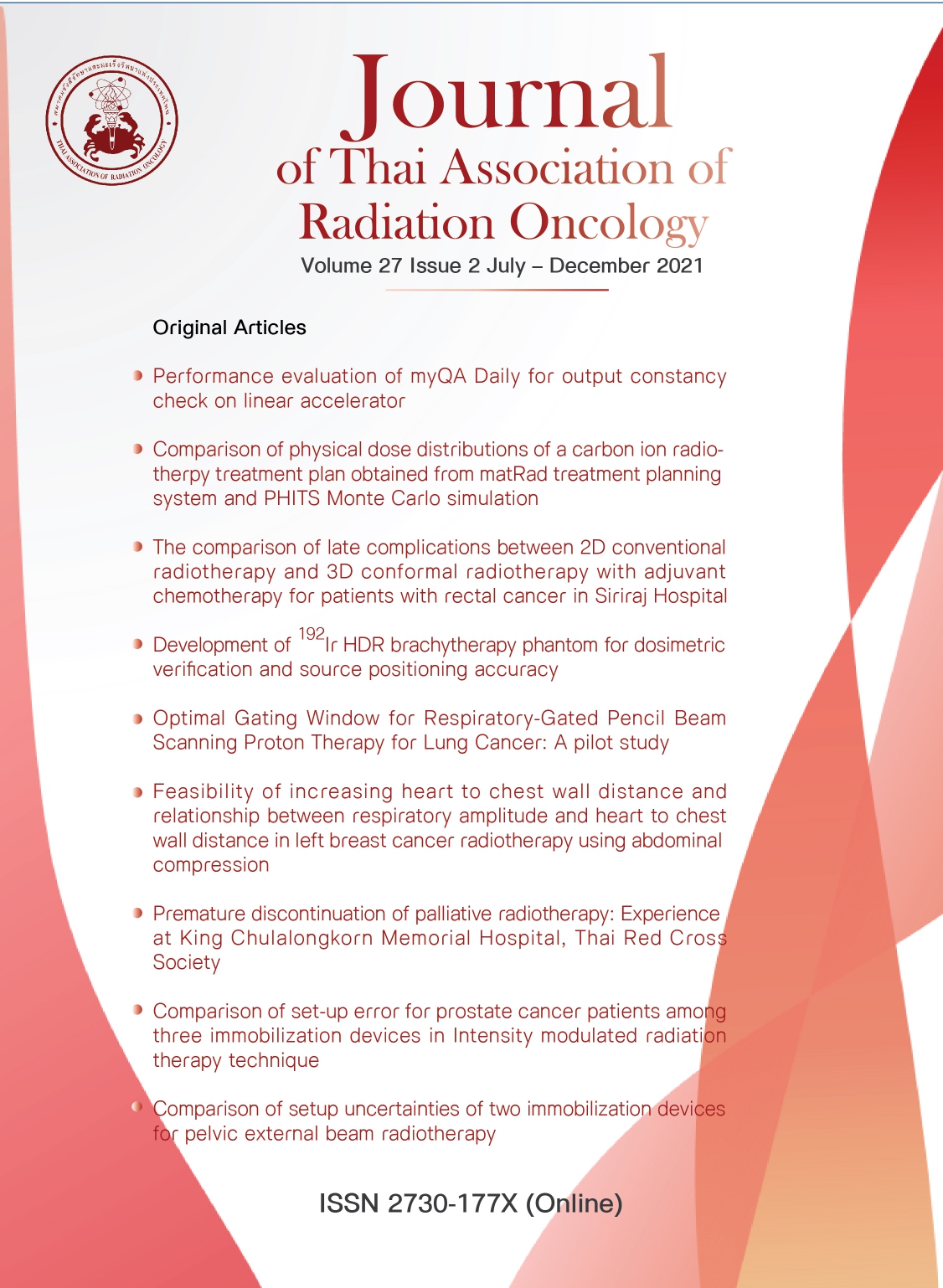Premature discontinuation of palliative radiotherapy: Experience at King Chulalongkorn Memorial Hospital, Thai Red Cross Society
Keywords:
Cancer, Radiotherapy, Palliative, Premature discontinuationAbstract
Background: Causes of treatment break or incomplete radiation therapy should be analysed to prevent premature discontinuation of palliative radiotherapy.
Objective: This study aimed to analyze the frequency and causes of premature discontinuation of palliative radiotherapy at King Chulalongkorn Memorial Hospital.
Materials and Methods: This is a retrospective cohort study in patients underwent palliative radiation therapy between September 2020 and December 2020.
Result: A total of 297 patients underwent palliative radiation therapy was included. Two hundred and seventy-five patients (92.6%) completed radiation course, 238 of these patients (80.1%) had completed radiation without treatment break, while 37 patients (12.5%) had temporary treatment break. The most common causes of treatment break included acute side effects and personal reasons. Twenty-two patients (7.4%) did not finish their radiation courses: 2.0% did not start treatment after simulation, 1.3% had near completion, 1.3% had partial completion and 2.7% received less than half of their radiation course. The common reasons for not completed radiation course were death between radiation treatment period and patients’ refusal.
Conclusion: Most patients completed their palliative radiation treatment courses. A fraction of patients could not complete their radiation courses or had temporary treatment break. The causes identified by this study may help preventing unnecessary discontinuation of palliative radiation therapy.
References
Fu KK, Pajak TF, Trotti A, CU Jones, SA Spencer, TL Phillips, et al. A Radiation Therapy Oncology Group (RTOG) phase III randomized study to compare hyperfractionation and two variants of accelerated fractionation to standard fractionation radiotherapy for head and neck squamous cell carcinomas: first report of RTOG 9003. Int J Radiat Oncol Biol Phys 2000; 48: 7–16.
Suwinski R, Sowa A, Rutkowski T, Wydmanski J, Tarnawski R, Maciejewski B, et al. Time factor in postoperative radiotherapy: a multivariate locoregional control analysis in 868 patients. Int J Radiat Oncol Biol Phys 2003; 56: 399–4
Groome PA, O’Sullivan B, Mackillop WJ, Jackson LD, Schulze K, Irish JC, et al. Compromised local control due to treatment interruptions and late treatment breaks in early glottic cancer: Population-based outcomes study supporting need for intensified treatment schedules. Int J Radiat Oncol Biol Phys 2006; 64: 1002– 12.
Machtay M, Hsu C, Komaki R, Sause WT, Swann RS, Langer CJ, et al. Effect of overall treatment time on outcomes after concurrent chemoradiation for locally advanced non-small-cell lung carcinoma: analysis of the Radiation Therapy Oncology Group (RTOG) experience. Int J Radiat Oncol Biol Phys 2005, 63: 667– 71.
Bese NS, Sut PA, Ober A. The effect of treatment interruptions in the postoperative irradiation of breast cancer. Oncology 2005,69:214–23.
WeberDC, KurtzJM, AllalAS. The impact of gap duration on local control in anal canal carcinoma treated by split course radiotherapy and concomitant chemotherapy. Int J Radiat Oncol Biol Phys 2001; 50: 675–80.
Perez CA, Michalski J, Mansur D, Lockett MA. Impact of elapsed treatment time on outcome of external-beam radiation therapy for localized carcinoma of the prostate. Cancer J 2004; 10: 349–56.
Harada H, Inoue M, Itasaka S, Hirota K, Morinibu A, Shinomiya K, et al. Cancer cells that survive radiation therapy acquire HIF-1activity and translocate towards tumour blood vessels. Nat Commun 2012; 3: 783.
Gripp S, Mjartan S, Boelke E, Willers R. Palliative radiotherapy tailored to life expectancy in end-stage cancer patients: Reality or myth? Cancer 2010; 116:3251-325
Toole M, Lutz S, Johnstone PA. Radiation oncology quality: Aggressiveness of cancer care near the end of life. J Am Coll Radiol 2012; 9:199-202.
Tiwana MS, Barnes M, Kiraly A, Olson RA. Utilization of palliative radiotherapy for bone metastases near end of life in a population-based cohort. BMC Palliat Care 2016; 15:2.
Kress MA, Jensen RE, Tsai HT, Lobo T, Satinsky A, Potosky AL. Radiation therapy at the end of life: A population-based study examining palliative treatment intensity. Radiat Oncol 2015; 10:15
Glare P, Virik K, Jones M, Hudson M, Eychmuller S, Simes J, et al. A systematic review of physicians’ survival pre- dictions in terminally ill cancer patients. BMJ 2003; 327:195-198.
Christakis NA, Lamont EB. Extent and determinants of error in doctors’ prognoses in terminally ill patients: Prospective cohort study. BMJ 2000; 320:469-472.
Glare P, Sinclair C, Downing M, Stone P, Maltoni M, Vigano A, et al. Predicting survival in patients with advanced disease. Eur J Cancer 2008; 44:1146-1156.
Chow E, Davis L, Panzarella T, Hayter C, Szumacher E, Loblaw A, et al. Accuracy of survival prediction by palliative radiation oncologists. Int J Radiat Oncol Biol Phys 2005; 61:870-873.
The Global Cancer Observatory. (2018). Thailand Source: Globocan 2018. Retrieved August 23, 2020, From https://gco.iarc.fr/today/data/factsheets/populations/764-thailand-fact-sheets.pdf
Lee JA, Lee NK, Yoon WS, Yang DS, Kim CY, Lee SR, et al. Treatment interruption during radiation therapy: Experience at a single institution in the Republic of Korea. Asia Pac J Clin Oncol. 2017;13: e481-e488
Arenas M, Sabater S, Gascón M, Henríquez I, Bueno MJ, Rius À, et al. Quality assurance in radiotherapy: analysis of the causes of not starting or early radiotherapy withdrawal. Radiat Oncol. 2014; 9:260.
Chen YP, Tsang NM, Tseng CK, Lin SY. Causes of interruption of radiotherapy in nasopharyngeal carcinoma patients in Taiwan. Jpn J Clin Oncol. 2000;30: 230-234
Lazarev S, Gupta V, Ghiassi-Nejad Z, Miles B, Scarborough B, Misiukiewicz KJ, et al. Premature discontinuation of curative radiotherapy: insights from head and neck irradiation. Adv Radiat Oncol. 2017;3: 62-69
Puckett LL, Luitweiler E, Potters L, Teckie S. Preventing Discontinuation of Radiation Therapy: Predictive Factors to Improve Patient Selection for Palliative Treatment. J Oncol Pract. 2017;13: e782-e791.
Downloads
Published
How to Cite
Issue
Section
License
บทความที่ได้รับการตีพิมพ์เป็นลิขสิทธิ์ของวารสารมะเร็งวิวัฒน์ ข้อความที่ปรากฏในบทความแต่ละเรื่องในวารสารวิชาการเล่มนี้เป็นความคิดเห็นส่วนตัวของผู้เขียนแต่ละท่านไม่เกี่ยวข้องกับ และบุคคลากรท่านอื่น ๆ ใน สมาคมฯ แต่อย่างใด ความรับผิดชอบองค์ประกอบทั้งหมดของบทความแต่ละเรื่องเป็นของผู้เขียนแต่ละท่าน หากมีความผิดพลาดใดๆ ผู้เขียนแต่ละท่านจะรับผิดชอบบทความของตนเองแต่ผู้เดียว




